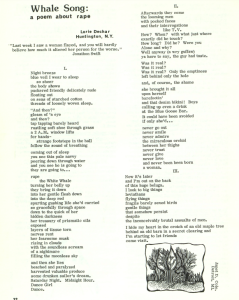Awareness surrounding the epidemic of rape grew dramatically during Second Wave Feminism, as poets and writers began to share their lived experiences, and then found support from a community of women that respected and valued said stories. In “Poem About My Rights,” by June Jordan, the narrator discusses her identity as a woman and how that identity and its relation to rape have shaped how she views herself. Jordan emphasizes this in the lines, “I am the history of rape / I am the history of the rejection of who I am / I am the history of the terrorized incarceration of / myself” (77-80). This poem epitomizes women’s growth in the expression of their emotions about rape, ranging from self-destructive undertones of self-blame in the beginning to a realization that “I am not wrong: Wrong is not my name / My name is my own my own my own” (Jordan 109-110). The self-destructive undertones that pervade the beginning of the poem are apparent in the fact that the narrator initially believes that her identity is what hinders her self-expression and freeing actions. The actuality of the matter is that the despicable actions of men are what warrant feelings within women that they are at fault for what happens to them.
In Women: A Journal of Liberation, Lorie Dechar shares a poem titled, “Whale Song: a poem about rape.”

“Whale song: a poem about rape” by Lorie Dechar, featured in Women: A Journal of Liberation vol. 6 no. 2.
This poem discusses the disturbing impacts of rape by comparing a whale to a woman through an extended metaphor. This is apparent in the lines that follow the act of the rape in the poem, “and then she lies / beached and paralyzed / harvested and valuable produce / some drunken sailor’s dream” (Dechar 42-45). The words “paralyzed” and “valuable produce” simultaneously illustrate the dehumanizing nature of rape and the rapist’s malicious intentions. Additionally, the formation of the lines and the effortlessly integrated imagery within the poem help to encapsulate numerous feelings of survivors. For instance, Dechar appropriately writes of the blames placed on women when they are raped in efforts to demonstrate that women should never be blamed for being assaulted. She writes, “never go out / never smile / never admire / … / never love / and never been born / a woman” (Dechar 73-75, 80-82). This supports the idea that the simple act of being alive is dangerous for women, as they are constantly being taken advantage of. Dechar also perpetuates the notion that the imperiling hands of men are simultaneously beyond belief, while also being feasible to understand due to lived experiences of assault. She writes, “I look to big things / … / gentle things / that somehow persist / despite / the inconceivably brutal assaults of men” (Dechar 86, 90-93). Finally, Dechar summarizes survivors’ sentiments in regards to sharing their stories in the form of writing by stating, “I hide my heart in the crotch of an old maple tree / behind an old barn in a secret clearing and / I’m starting to let friends / come visit” (94-97). By sharing one’s survival in the form of writing, not only is the writer letting people in, but finding a supportive network of people that help to amplify the survivor’s voice.
Sources:
Dechar, Lorie. “Whale Song: a poem about rape.” Women: A Journal of Liberation vol. 6, no. 2, 1 January 1975, p. 32.
Jordan, June. “Poem about My Rights by June Jordan.” Poetry Foundation, Poetry Foundation, 2005, https://www.poetryfoundation.org/poems/48762/poem-about-my-rights
“June Jordan – Poem About My Rights.” YouTube, YouTube, 13 Nov. 2011, https://www.youtube.com/watch?v=XUSTxhYu7-4
Women: A Journal of Liberation vol. 6, no. 2, 1 January 1975.
